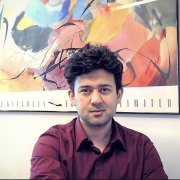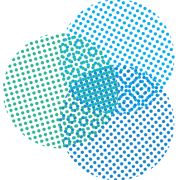February 27, 2024 - 3:00 pm
McGovern Reading Room (46-5165)
Arash Afraz Ph.D., Chief of unit on neurons, circuits and behavior, laboratory of neuropsychology, NIMH, NIH
Abstract: Local perturbation of neural activity in high-level visual cortical areas alters visual perception. Quantitative characterization of these perceptual alterations holds the key to understanding the mapping between patterns of neuronal activity and elements of perception. The complexity and...
December 7, 2023 - 2:30 pm
McGovern Seminar Room (46-3189)
Daniel Mitropolsky, Columbia University
Abstract: How do neurons, in their collective action, beget cognition, as well as intelligence and reasoning? As Richard Axel recently put it, we do not have a logic for the transformation of neural activity into thought and action; discerning this logic as the most important future direction of...
November 7, 2023 - 4:00 pm
McGovern Reading Room (46-5165)
Pouya Bashivan, McGill University
Abstract:
Across the primate neocortex, neurons that perform similar functions tend to be spatially grouped together. How such organization emerges and why have been debated extensively, with various models successfully replicating aspects of cortical topography using cost functions and learning...
Across the primate neocortex, neurons that perform similar functions tend to be spatially grouped together. How such organization emerges and why have been debated extensively, with various models successfully replicating aspects of cortical topography using cost functions and learning...
September 26, 2023 - 4:00 pm
McGovern Reading Room (46-5165)
Moderator: Ila Fiete; Panelists: Akshay Rangamani, Tomer Galanti, Sugandha Sharma and Sarthak Chandra
Abstract:
This discussion will feature panelists from the Poggio and Fiete labs describing ongoing work on deep classifiers and hippocampal-inspired networks, respectively. Following brief presentations by each panelist, Ila Fiete will steer a discussion to explore strengths, limitations and...
This discussion will feature panelists from the Poggio and Fiete labs describing ongoing work on deep classifiers and hippocampal-inspired networks, respectively. Following brief presentations by each panelist, Ila Fiete will steer a discussion to explore strengths, limitations and...
September 19, 2023 - 4:00 pm
MIBR Reading Room 46-5165
Aran Nayebi, ICoN Postdoctoral Fellow at MIT
Abstract:
Deep neural networks trained on high-variation tasks ("goals”) have had immense success as predictive models of the human and non-human primate visual pathways. More specifically, a positive relationship has been observed between model performance on ImageNet categorization and neural...
Deep neural networks trained on high-variation tasks ("goals”) have had immense success as predictive models of the human and non-human primate visual pathways. More specifically, a positive relationship has been observed between model performance on ImageNet categorization and neural...
March 28, 2023 - 4:00 pm
McGovern Reading Room (46-5165)
H. N. Mhaskar - Claremont Graduate University, Claremont.
The fundamental problem of machine learning is often formulated as the problem of function approximation. For example, we have data of the form {(xj,yj)}, where yj is the class label for xj, and we want to approximate the class label as a function of the input x. The standard way for this...
February 28, 2023 - 4:00 pm
McGovern Reading Room (46-5165)
Meenakshi Khosla (Kanwisher lab postdoc)
Abstract: Neuroscience is currently undergoing an explosion in the availability of large-scale brain activity data, so the major challenge no longer lies in data collection, but also in deriving understanding from this abundant stream of complex, high-dimensional, noisy data with methods that fully...
February 14, 2023 - 4:00 pm
McGovern Reading Room (46-5165)
Akhilan Boopathy, MIT graduate student in the Fiete Lab
Abstract: The measure of a machine learning algorithm is the difficulty of the tasks it can perform, and sufficiently difficult tasks are critical drivers of strong machine learning models. However, quantifying the generalization difficulty of machine learning benchmarks has remained challenging....
December 6, 2022 - 4:00 pm
McGovern Seminar Room (46-3189)
Diego Mendoza-Halliday, Research Scientist, McGovern Institute for Brain Research at MIT
In person and open to the MIT Community.
Abstract:
Visual attention and working memory are two different cognitive functions. However, because of their close relationship and interactions, it is often claimed that they share the same underlying neuronal mechanisms. Here, I will first describe...
Abstract:
Visual attention and working memory are two different cognitive functions. However, because of their close relationship and interactions, it is often claimed that they share the same underlying neuronal mechanisms. Here, I will first describe...
October 11, 2022 - 4:00 pm
MIBR Reading Room 45-5165
Phillip Isola and Brian Cheung.
This is meant to be an informal discussion in which Phillip and Brian will give an overview of transformer networks and then we will open the floor for questions and discussion. It is likely that we will have another meeting at a later time discussing what transformers may contribute to...
September 13, 2022 - 4:00 pm
McGovern Reading Room (fallback Singleton Auditorium 46-3002)
Profs. Jim DiCarlo (Director, MIT Quest) and Tomaso Poggio (Director, CBMM)
Topic: New Home: CBMM is now part of the MIT Quest for Intelligence Initiative
We will have a combined CBMM | Quest research meeting to discuss CBMM’s recent move to the MIT Quest for Intelligence Initiative (MIT Quest.) A reception will be held immediately following the meeting. Hope you will be...
We will have a combined CBMM | Quest research meeting to discuss CBMM’s recent move to the MIT Quest for Intelligence Initiative (MIT Quest.) A reception will be held immediately following the meeting. Hope you will be...
February 15, 2022 - 4:00 pm
Dr. Kohitij Kar, DiCarlo Lab, MIT
The Spring 2022 CBMM Research Meetings will be hosted in a hybrid format. Please see the information included below regarding attending the event either in-person or remotely via Zoom connection
Please note, MIT is requiring that all attendees, including MIT COVIDpass users, sign-in to the event...
Please note, MIT is requiring that all attendees, including MIT COVIDpass users, sign-in to the event...
November 30, 2021 - 4:00 pm
Dr. Andrei Barbu, Research Scientist, InfoLab, CSAIL MITYen-Ling Kuo, InfoLab, CSAIL MIT
Please note the change in date and format for this research meeting. This meeting will be held on Tues., Nov. 30, 2021; (Previously scheduled for Nov. 23rd.) This meeting will also be held in a fully remote format via Zoom.
Abstract: Language, and more generally the principle of compositionality,...
Abstract: Language, and more generally the principle of compositionality,...
November 2, 2021 - 4:00 pm
Vivian Paulun
Title: Wobbling, drooping, bouncing—Visual perception of materials and their properties
Abstract: Visual inference of material properties like mass, compliance, elasticity or fragility is crucial to predicting and interacting with our environment. Yet, it is unclear how the brain achieves...
Abstract: Visual inference of material properties like mass, compliance, elasticity or fragility is crucial to predicting and interacting with our environment. Yet, it is unclear how the brain achieves...
October 26, 2021 - 4:00 pm
MIBR Seminar Room 46-3189
Drs. Jie Zheng and Mengmi Zhang
Please note, Dr. Zhang will be presenting remotely via Zoom.
Abstract:
Jie Zheng's presentation:
Title: Neurons that structure memories of ordered experience in human
Abstract: The process of constructing temporal associations among related events is essential to episodic memory. However, what neural mechanism helps accomplish this function remains unclear...
Jie Zheng's presentation:
Title: Neurons that structure memories of ordered experience in human
Abstract: The process of constructing temporal associations among related events is essential to episodic memory. However, what neural mechanism helps accomplish this function remains unclear...











